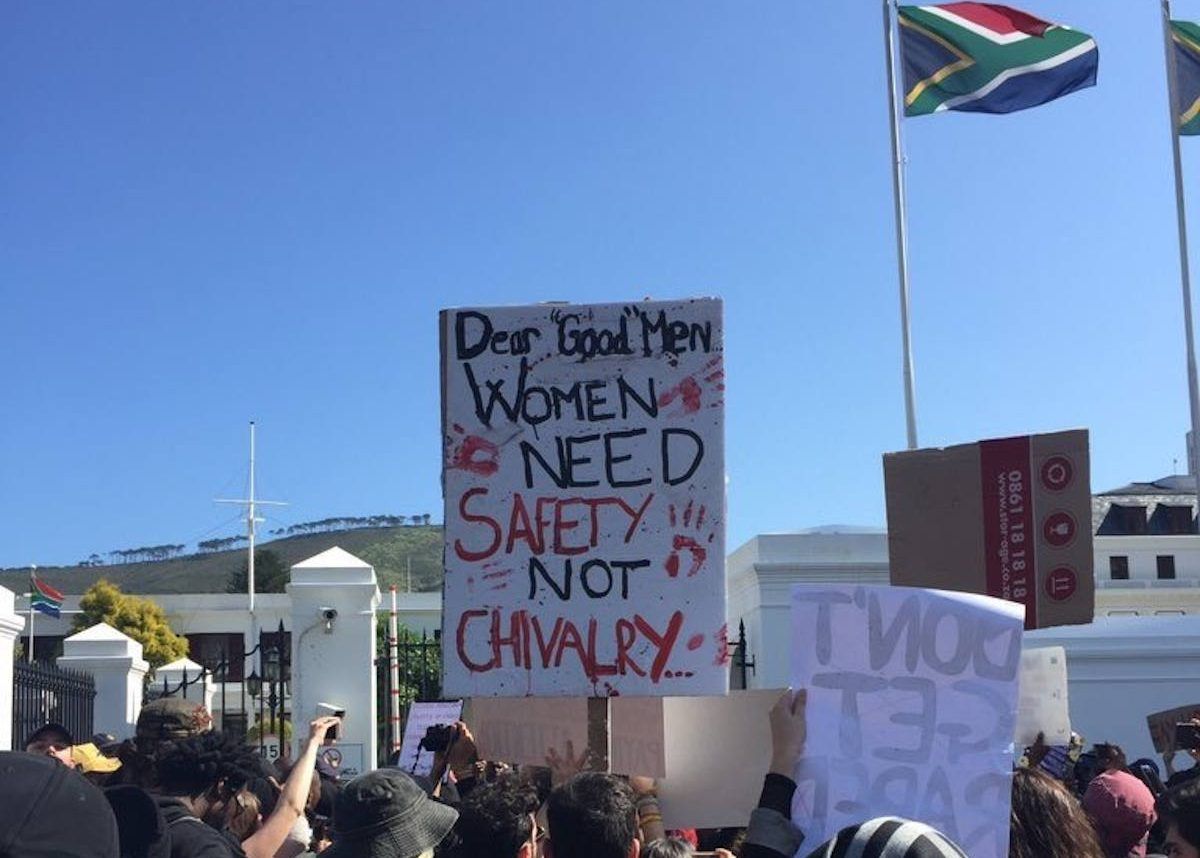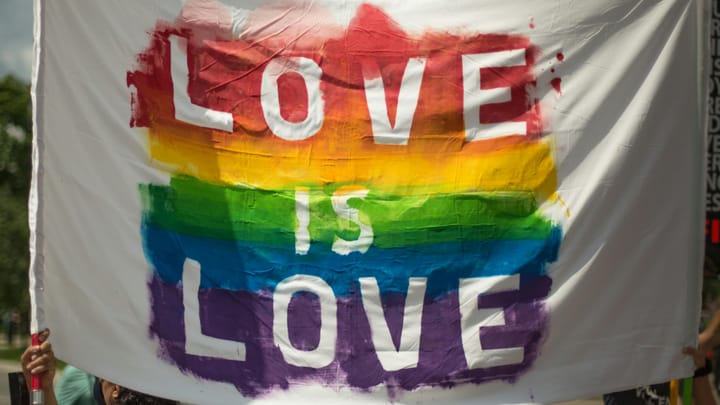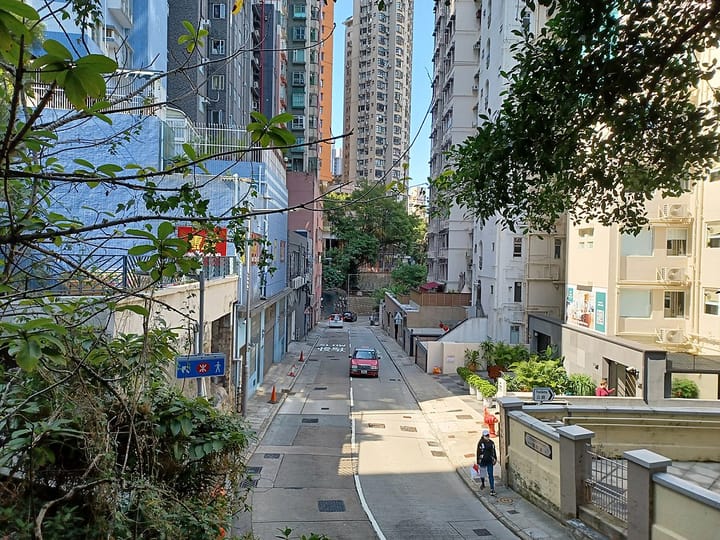South African Gender-Based Violence Crisis – Facts, Causes and Ramaphosa’s Plan

A few minutes every morning is all you need.
Stay up to date on the world's Headlines and Human Stories. It's fun, it's factual, it's fluff-free.
August is Women’s Month in South Africa, commemorating the 1956 Women’s March on Pretoria’s Union Buildings, a protest against the apartheid regime and the 1948 laws that established it. Unfortunately, 2019 celebrations of Women’s Month were marred by media reports of a spate of rapes and murders of young South African women.
The most publicized recent story was the rape and murder of Cape Town student Uyinene Mrwetyana. She was collecting a parcel at the Cape Town post office when a male employee attacked her. A few days earlier, champion boxer Leighandre Jegels was allegedly killed by her ex-boyfriend.
Around the same time, police found the body of 14-year-old Janika Mello, who was raped and murdered, in her grandmother’s backyard. Another woman from Cape Town, Meghan Cremer, was allegedly killed by three men as she left her farm. With the gruesome 2018 murder of student Karabo Mokoena by her boyfriend still fresh in South Africans’ minds, the August headlines renewed public outrage over gender-based violence (GBV).
Recent Protests and the Government’s Response
The social movements #TotalShutdown and #AmINext rallied thousands of women to protest against femicide and the abuse of women in Cape Town on the 4th of September, the first day of the World Economic Forum (WEF) on Africa. Protesters called for stronger action from the government, including harsher sentences for perpetrators of sexual offenses and a change in how the criminal justice system handles cases of sexual assault.
The South African government’s response to the recent killings and to the issue of gender-based violence generally has drawn harsh public criticism. A September 2 government tweet read, “Violence and abuse against women have no place in our society. Govt is calling on women to speak out, and not allow themselves to become victims by keeping quiet. Women who speak out are able to act, affect change and help others.”
This statement has been widely condemned both within and outside South Africa, due to the government’s apparent reluctance to hold men accountable for the abuse of women. The implication that women are responsible for the abuse they endure sparked intense outrage.
President Cyril Ramaphosa excused himself from leading a panel at the WEF meeting to address a crowd that presented him with a memorandum. Among other demands, the document calls for the government to make the national sexual offenses registry accessible to the public. The president admitted that the country is facing a crisis of gender-based violence, pledging that the government will devise a plan to deal with systemic problems that often stall the prosecution of rape cases.
Following Ramaphosa’s statement, General Khehla Sitole, the National Police Commissioner, acknowledged that the South African Police Service needs to reform its strategy for handling gender-based violence cases. Sitole noted that police officers will need training on how to deal with these cases proactively and sensitively.
After several years of apparent decrease, gender-based violence numbers rose during the 2018/2019 South African financial year. Many feel that a long-term solution to the problem can only be achieved by addressing the root causes of violence in the country.
[article_ad]
South Africa’s Crime Data and Violent History
Crime statistics for 2018/2019 revealed that South African police recorded approximately 52,000 sexual offenses, 36,000 (roughly 70%) of which were crimes against women. The actual number of sexual violence offenses was likely significantly higher, since many victims are afraid to report the crimes.
The BBC states that reported rape cases increased in South Africa by almost 4% from 2018 to 2019, with non-rape sexual assault cases increasing by over 9%. These figures represent the first significant rise in reported sexual offenses since 2012-2013.
Meanwhile, the number of murders in South Africa has risen every year since 2013. For a portion of that time period, however, murders of women actually declined. In 2000, women were killed in South Africa at well over five times the global rate. By 2015, South Africa’s murder rate of women had declined by over half, while the global rate had held roughly steady. Unfortunately, this progress was virtually wiped out by a 117% increase in the South African femicide rate from 2015 to 2017.
By 2018, women were once again being murdered in South Africa at about five times the global rate. The murder rate of women did drop slightly between 2017/2018 and 2018/2019, from about 2,900 to about 2,700 reported cases, a decrease of 5.4%.
Policymakers have noted that South African society has a larger problem of violence that must be addressed. Normalized violent behavior exists both among men and in relations between men and women. For every woman murdered, six men become victims of the same crime.
Gareth Newman of the Institute for Security Studies asserts that violence seems to have become an acceptable way of settling disputes or asserting authority in South Africa. Newman notes that this violence-centered value system stems from apartheid, the system of extreme racial segregation and discrimination against non-White South Africans that existed from 1948 until the early 1990s. During the apartheid era, he explains, violence was the norm, a means of systematically entrenching authority and quelling dissent.
Nevertheless, the role of gender in South African violent crimes cannot be ignored. In all the recent headline-grabbing cases of violence against women, the perpetrators have been men. Broader national crime statistics confirm that men are overwhelmingly the offenders in sexual abuse cases. In a 2009 study by the country’s Medical Research Council, one in four South African men surveyed admitted to having committed a rape.
South African Attitudes About GBV
The 2018/2019 crime statistics show that while criminal behavior such as robbery is the most common reason for murder in South Africa, domestic violence and arguments also rank high on the list.
In a 2018 report on crimes against women, Stats SA found that 7.7% of men and 6.8% of women in South Africa believe that it is acceptable for a man to hit his wife if she argues with him.
Nearly as many respondents expressed the same view in the case of a woman leaving home without telling her husband, while 1.3% of both men and women consider striking a woman acceptable if the woman merely burns food.
During the September marches against gender-based violence, protesters called for an end to this culture of disrespect toward women and disregard for women’s rights. Perpetuated by traditional beliefs that lower the social status of women, this culture has deep roots in the violence and exploitation of European colonialism. In a study published in The American Historical Review, researcher Pamela Scully found that rape was a central tool used by European colonial authorities to solidify their positions of power.
Newman adds that the majority of South African men have learned to feel entitled to use violence in a variety of situations. This sense of entitlement fuels a culture in which women and children become targets, because men believe it is their right to use whatever means will ensure compliance with their demands.
[article_ad]
Ramaphosa’s Proposal to Address Gender-Based Violence
In the wake of the #AmINext protests and widespread public outcry over the recent murders, President Cyril Ramaphosa laid out a 10-point plan to deal with the issue of gender-based violence.
The plan includes a review and update of existing laws on domestic violence and sexual offenses to prioritize the needs of survivors. Other actions Ramaphosa has proposed to his Cabinet include making the national register of gender-based violence offenders public, and instituting harsher sentences for crimes against women and children.
Police portfolio committee chair Tina Joemat-Pettersson made the point that fighting gender-based violence is going to take efforts from both communities and the police. Her words echo those of Police Minister Bheki Cele in his announcement of the 2018/2019 crime statistics. In that presentation, Cele emphasized the need to deal with the root causes of crime – primarily learned violent behavior in the home and the community – in order to significantly reduce violence.
The Institute for Security Studies shares this sentiment, saying that although police reform and a stronger prosecuting authority are urgently needed to curb gender-based violence, society needs to look at broader long-term solutions. The institute’s proposed measures include positive parenting programs, anti-bullying campaigns in schools, rehabilitation programs for drug and alcohol abuse, and the creation of community groups that foster healthy attitudes about being a man or a woman.
With respect to law enforcement, Joemat-Petterson’s committee noted that crime-combating strategies need to be preventive rather than just reactive, and this can be achieved mainly by collaboration between police and communities.
Meanwhile, the South African Police Service’s review of its anti-rape strategy led to a conclusion consistent with long-held public sentiments: The police need better training on how to handle cases of gender-based violence, from the moment when victims report cases through the prosecution of perpetrators and beyond.
Continuing Public Pressure to Respond to GBV
Civil societies and the public embarked on the #SandtonShutdown protest in Johannesburg during the second week of September 2019, keeping the pressure on Ramaphosa and Parliament to implement the president’s action plan without delay.
In addition to holding the government accountable, activists are calling on corporations to take action to reform the nation’s business sector in support of women. Participants in the Sandton Shutdown protests delivered a memorandum to the CEO of the Johannesburg Stock Exchange, Nicky Newton-King, calling for the exchange to pay a 2% levy to organizations fighting against GBV.
Sweeping cultural change never comes easily, but these recent developments suggest that South Africa is turning a crisis into the first steps toward an eventual #TotalShutdown of gender-based violence in the country.
[article_ad]




Comments ()